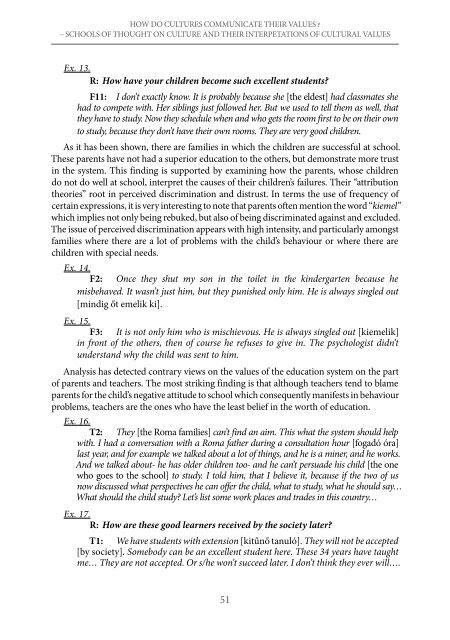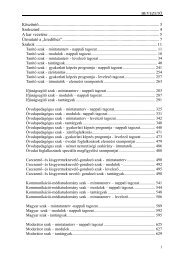ACTA SZEKSZARDIENSIUM - Pécsi Tudományegyetem Illyés Gyula ...
ACTA SZEKSZARDIENSIUM - Pécsi Tudományegyetem Illyés Gyula ...
ACTA SZEKSZARDIENSIUM - Pécsi Tudományegyetem Illyés Gyula ...
Create successful ePaper yourself
Turn your PDF publications into a flip-book with our unique Google optimized e-Paper software.
HOW DO CULTURES COMMUNICATE THEIR VALUES ?<br />
– SCHOOLS OF THOUGHT ON CULTURE AND THEIR INTERPETATIONS OF CULTURAL VALUES<br />
Ex. 13.<br />
R: How have your children become such excellent students?<br />
F11: I don’t exactly know. It is probably because she [the eldest] had classmates she<br />
had to compete with. Her siblings just followed her. But we used to tell them as well, that<br />
they have to study. Now they schedule when and who gets the room first to be on their own<br />
to study, because they don’t have their own rooms. They are very good children.<br />
As it has been shown, there are families in which the children are successful at school.<br />
These parents have not had a superior education to the others, but demonstrate more trust<br />
in the system. This finding is supported by examining how the parents, whose children<br />
do not do well at school, interpret the causes of their children’s failures. Their “attribution<br />
theories” root in perceived discrimination and distrust. In terms the use of frequency of<br />
certain expressions, it is very interesting to note that parents often mention the word “kiemel”<br />
which implies not only being rebuked, but also of being discriminated against and excluded.<br />
The issue of perceived discrimination appears with high intensity, and particularly amongst<br />
families where there are a lot of problems with the child’s behaviour or where there are<br />
children with special needs.<br />
Ex. 14.<br />
F2: once they shut my son in the toilet in the kindergarten because he<br />
misbehaved. It wasn’t just him, but they punished only him. He is always singled out<br />
[mindig őt emelik ki].<br />
Ex. 15.<br />
F3: It is not only him who is mischievous. He is always singled out [kiemelik]<br />
in front of the others, then of course he refuses to give in. The psychologist didn’t<br />
understand why the child was sent to him.<br />
Analysis has detected contrary views on the values of the education system on the part<br />
of parents and teachers. The most striking finding is that although teachers tend to blame<br />
parents for the child’s negative attitude to school which consequently manifests in behaviour<br />
problems, teachers are the ones who have the least belief in the worth of education.<br />
Ex. 16.<br />
T2: They [the Roma families] can’t find an aim. This what the system should help<br />
with. I had a conversation with a roma father during a consultation hour [fogadó óra]<br />
last year, and for example we talked about a lot of things, and he is a miner, and he works.<br />
And we talked about- he has older children too- and he can’t persuade his child [the one<br />
who goes to the school] to study. I told him, that I believe it, because if the two of us<br />
now discussed what perspectives he can offer the child, what to study, what he should say…<br />
What should the child study? Let’s list some work places and trades in this country…<br />
Ex. 17.<br />
R: How are these good learners received by the society later?<br />
T1: We have students with extension [kitűnő tanuló]. They will not be accepted<br />
[by society]. Somebody can be an excellent student here. These 34 years have taught<br />
me… They are not accepted. or s/he won’t succeed later. I don’t think they ever will….<br />
51




